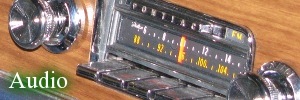















States Want to Bulldoze Highway Funding Formula |
|---|

|
Larry Schooler
Austin, Texas
January 11, 2005
 Listen to States Want to Bulldoze Highway Funding Formula - MP3 - 2.0MB - 4:24
Listen to States Want to Bulldoze Highway Funding Formula - MP3 - 2.0MB - 4:24
 Listen to States Want to Bulldoze Highway Funding Formula - RealPlayer - 686KB - 4:24
Listen to States Want to Bulldoze Highway Funding Formula - RealPlayer - 686KB - 4:24
There is no free ride - especially on America's highways. As the number of drivers keeps growing, it is becoming nearly impossible to build enough roads to accommodate them. That has led to a money crunch that is pitting one state against another.
The funds for much of nation's highway construction come from federal gasoline taxes collected by the 50 states and then allocated by the federal government to pay for state road building projects. Now that the U.S. Congress has reconvened, more than a dozen states are pressing lawmakers to change the way these funds are allocated. The debate is picking up from last year, when Congress adjourned without passing the Transportation Equity Act, which would have authorized federal funding for road construction for the next six years.
Most concerned are the so-called "donor states," which get back in funding only a portion of the gasoline tax revenue they send to the Federal Aid Highway Program. Other states show a net gain -- receiving more road-building money than they contribute in taxes. That inequity happens because each state has two Senators, and Senators from small states can defeat a bill that does not give them enough money for roads.
Also, some Senators are more powerful than others. So, for example, less populous states like Alaska -- represented by Senate Appropriations Committee chairman Ted Stevens -- end up getting proportionally more money for highways. And that, says Texas Congresswoman Eddie Bernice Johnson, creates budget problems for the states. "States can't plan, can't get projects started without knowing whether there'll be enough money to finish them," she says. "And the longer you wait, the more expensive [a project] will become."
As a donor state, Texas is trying to balance out the funding equation. The Texas Department of Transportation, known as TXDOT, is part of the SHARE Alliance -- a group of more than a dozen states that give more in gasoline taxes than they get back. TXDOT Legislative Analyst Tonia Ramirez says Texas gets around 85 cents for every dollar paid in gas taxes. But it might get more if it had more mass transit. Ms. Ramirez says the U.S. Congress seems to favor states whose well-established mass transit systems take cars off the highways.
"In the Northeast," Ms. Ramirez points out, "they have needs that are different -- older mass transit systems that require more cost to replace and maintain. We have relatively newer systems, but we have more. Our perspective as donor states is that we're contributing money, and we have needs that need to be addressed, and the closer we get to a fair share, [the] more money [will be] available to take care of those needs."
The federal highway fund has only so many dollars - not nearly enough to cover all the roads projects across the country. Ron Utt, senior research fellow at the Washington-based think tank, The Heritage Foundation, says there is little support in the federal government for putting more money into the fund. "The highway program is self-funded by the federal fuel tax," he says, "and there's been a great deal of reluctance to increase the fuel tax, both on the part of the motorists who pay the tax and the politicians who would have to vote for it."
Some Texas politicians have tried to use their votes to change the funding policy. Last year, U.S. Senator Kay Bailey Hutchison of Texas voted against the Transportation Equity Act, saying that Texas has been a big loser because it still pays more in gasoline taxes than it receives in funding. She wants to increase the amount of money Texas gets back for each dollar it pays in gas taxes, as does the Texas Department of Transportation.
But even though some of Senator Hutchison's colleagues support her, it is not something that members of Congress want to handle too much. Voting for a tax increase is never popular, and lobbying for pet projects in one's own state can generate negative publicity.
One idea some politicians have supported as a way of increasing road funding is to charge a toll on certain highways. In Austin, the Texas state capital, some leaders who voted for toll roads -- including Mayor Will Wynn and Council Member Brewster McCracken -- are facing the wrath of voters, some of whom want to recall them from office. Still, TXDOT's Tonia Ramirez says that does not mean toll roads are a horrible idea. "That issue, of course, is very contentious," she says, "because the truckers don't want to see the interstate [highways] tolled, a lot of the highway users don't want to see it tolled, and there are people that just don't think tolling is a good thing. But we're looking at it as another option for state and local people to use in determining how we're going to address our transportation options."
Ms. Ramirez is hoping that the Texas Congressional delegation will work to get the state more highway fund money - and more flexibility in how to spend it. That flexibility could, for example, allow Texas to place tolls on interstate highways without needing Congress to pass a law authorizing each toll project. Of course, members of Congress would have to be very careful how they voted on that subject. Voters across the country want their commute to be shorter. But they don't want their government to hand them a bill every time they leave the house.
